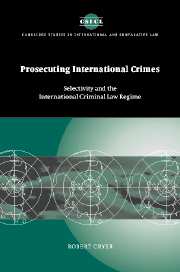Book contents
- Frontmatter
- Contents
- Preface and acknowledgements
- Table of cases
- Table of treaties
- List of abbreviations
- Introduction
- Part I The development of the international criminal law regime
- 1 The development of international criminal law
- 2 International criminal law: State rights, responsibilities and problems
- 3 International Criminal Tribunals and the regime of international criminal law enforcement
- Part II Evaluating the regime
- Conclusion
- Select bibliography
- Index
- CAMBRIDGE STUDIES IN INTERNATIONAL AND COMPARATIVE LAW
1 - The development of international criminal law
Published online by Cambridge University Press: 06 July 2009
- Frontmatter
- Contents
- Preface and acknowledgements
- Table of cases
- Table of treaties
- List of abbreviations
- Introduction
- Part I The development of the international criminal law regime
- 1 The development of international criminal law
- 2 International criminal law: State rights, responsibilities and problems
- 3 International Criminal Tribunals and the regime of international criminal law enforcement
- Part II Evaluating the regime
- Conclusion
- Select bibliography
- Index
- CAMBRIDGE STUDIES IN INTERNATIONAL AND COMPARATIVE LAW
Summary
Introduction
This chapter will trace the development of international criminal law and its enforcement mechanisms. Writing on the development of international criminal law after 1998 carries with it certain risks. It is all too simple to write a ‘Whig history’. Such a tale would be inaccurate. We cannot forget the role of contingency and pure chance. Had different choices been made in the twentieth century the situation could be considerably different, for better or for worse. Nonetheless, developments in international criminal law have occurred since the 1990s at a pace that is unprecedented.
There are a number of histories of international criminal law. It could be said that there is a small academic cottage industry engaged in discovering earlier and earlier examples of what might be termed prosecutions of international crimes. The greatest endeavours in this regard were those of Georg Schwarzenberger. There is a particular reason for discussing the historical aspects of international criminal law. Many of the problems, debates and solutions mooted are by no means novel. To proceed today in ignorance of what has been identified and discussed before is needlessly to retrace the footprints of the past.
Nonetheless, this chapter makes no claim to comprehensiveness. Neither is it a history of the laws of armed conflict. Others have told that story. A third qualification is that the author is a lawyer, not a historian, and therefore this chapter cannot profess historiographic sophistication.
- Type
- Chapter
- Information
- Prosecuting International CrimesSelectivity and the International Criminal Law Regime, pp. 9 - 72Publisher: Cambridge University PressPrint publication year: 2005
- 4
- Cited by



